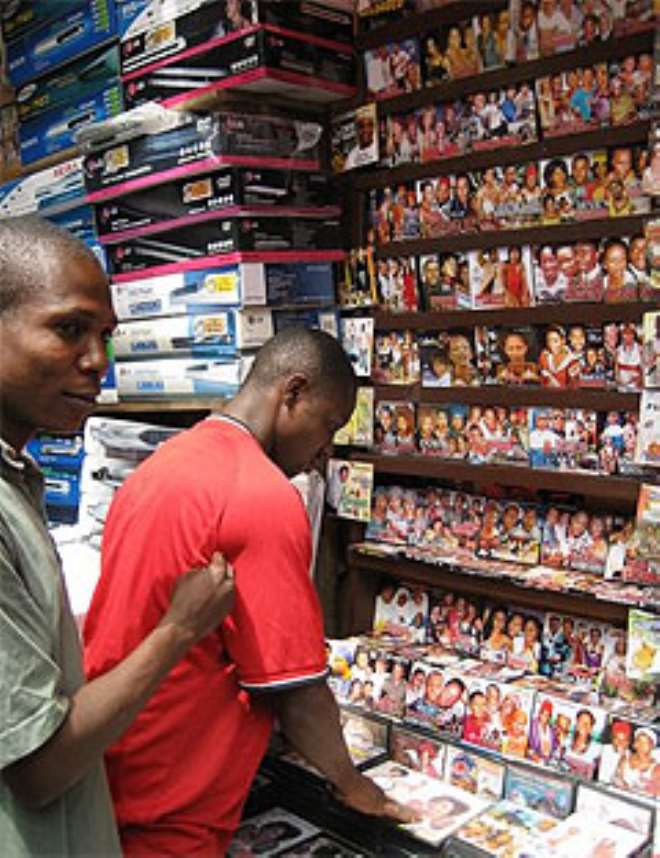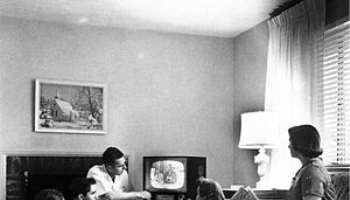Piracy Blitz Unites Film Industry
t's very easy to find pirated CD products even though the National Film and Video Censors Board in collaboration with Lagos State Film and Video Censor are fighting as hard as they can to curb the menace in the industry, Chinyere Okoye writes
The first step which the operators in film industry has taken and which is commendable is their plans to work with Filmmakers of Nigeria, USA (FAN USA), to organise their marketing and distribution strategy in Nigeria and to cut out piracy and bring money and efforts back in the Nigerian economy. This is commendable but more is to be done. Nigeria and the film industry are shortchanged.
The film industry have to learn to reach out in a highly organised form to engage the government, corporate entities and international organisations to seek grants, loans from banks to support and encourage the film industry.
In as much as these efforts is being made, effort should also be placed on high quality of the Nigerian movies, good story to tell about Nigeria and Africa, less emphasis on negative portrayal of the national and traditional lives. The positive story about the villages, culture, towns, elders, youths, schools, government, democracy, respect of rule of law and decency should be encouraged and emphasised.
Again, the impact of piracy is making the Nigerian film industry to lose huge amount annually. The National Film and Video Censors Board (NFVCB) has joined forces to convince movie fans that buying a pirated copy is encouraging clamping down of economy.
Nollywood has had a huge impact on African consciousness both on the continent and Diaspora, but the industry is not getting enough support from government or private sector. NFVCB has urged government to recognise that Nigeria's creative—Nollywood is the future of the nation's economic stability.
Recently, NFVCB and Lagos State Film and Video Censor (LSFVCB) came together for the way forward for film industry in Nigeria and to earn money from their sweat and not to let the industry become a curse like natural resources which has exposed Nigeria as a nation that does not value its people or its God given resources and talent.
To achieve this, NFVCB and LSFVCB are ready to sanitise the market and make it unsafe haven pirates.
Speaking at a joint press briefing in Lagos, the Special Adviser to the Director-General, NFVCB, Mr. Obiora Chukwumba, said the Federal Government was concerned that some markets have become the biggest piracy depot. Chukwumba, though did not disclose the strategies being put in place to combat the crime, but said in a short while; the approach would be unfolded, expressing optimism that it would yield positive result.
However, “Alaba market is a haven of piracy in the west coast, and government is already working out ways to stop the pirates. We have worked out a strategic plan to arrest this situation, but we shall not disclose this,” Chukwumba said.
“The Federal Government, through the NFVCB, in collaboration with the LSFVCB, is working hard to ensure that nobody shoots film anywhere without clarification from the state, insurance of the cast must also be done by the producer,” Chukwumba said.
According to the Executive Secretary, LSFVCB, Mr. Otunba Dapo Awobutu, the greatest problem in the film industry was piracy and the case of Nigeria had assumed a frightening dimension.
As part of the steps to be taken to address the menace of piracy, Awobutu said NFVCB and LSFVCB have concluded arrangement to eliminate hawkers of film products from the streets, adding that, those who produce and patronise them would have been minimised.
He also said the issue of censorship, by producers in the metropolis would be monitored by the LSFVCB in collaboration with the NFVCB under the new agreement. Mr. Edion Edward Abumere, the zonal coordinator southwest, said “what we are witnessing today in Nigeria is a revolution, and part of it is seen today.” He recalled that over the years, a lot of questions have been asked about what is happening in Kano and Lagos States, why the states set up their own censors boards, and why the board is not fighting them?
According to him, “we are to flag off a sustainable growth in the Nigerian film industry.” He said the NFVCB and LSFVCB believe that working together will ensure that structure is created that will enable broader objectives which is needed for better development.
He further explained that the restructuring cannot be done without the government and other stakeholders. Abumere said the NFVCB and LSFVCB believe fundamentally that all the constituent parts of the federation, the local and state governments have a very important role to play in the regulation of the film industry in Nigeria. He also advised that all must work together and ensure that a structure is created that will ensure that the broader objectives needed is achieved.
The zonal coordinator, also noted that “what we are seeing is the beginning of this roadmap, to create a new relationship which is for partnership.” He said if the partnership with the Lagos State Government succeeds, it will have a snowball effect in other states.
An actor, Jide Kosoko, said signing the Memorandum of Understanding is a welcome development. He however expressed fears that “if we can sustain this momentum and pondered whether it is not another way to slow down the NFVCB.” Though he expressed happiness over the event, he described it as a milestone in the history of the film industry in Lagos State and in Nigeria as a whole.
Latest News
-
 "If You're For Me, I Am For You" - Cubana Chief P
"If You're For Me, I Am For You" - Cubana Chief P -
 "3 Days To Go" - Femi Adebayo Urges Fans To Get S
"3 Days To Go" - Femi Adebayo Urges Fans To Get S -
 "Stop Asking Me Questions About Speed Darlington"
"Stop Asking Me Questions About Speed Darlington" -
 "Benue Is The Most Underdeveloped State I've Ever
"Benue Is The Most Underdeveloped State I've Ever -
 Stan Alieke Urges Young Professionals To Take Lin
Stan Alieke Urges Young Professionals To Take Lin -
 Chizzy Alichi Teases Fans With Baby Reveal, Promot
Chizzy Alichi Teases Fans With Baby Reveal, Promot -
 "I'm Not Wearing Makeup From July 4th Till Decemb
"I'm Not Wearing Makeup From July 4th Till Decemb -
 "Stop The Challenge Of Mocking Kids With Down Syn
"Stop The Challenge Of Mocking Kids With Down Syn -
 Regina Daniels Celebrates Sons As They Mark Birthd
Regina Daniels Celebrates Sons As They Mark Birthd -
 Speed Darlington Threatens To Sue NAPTIP For Defam
Speed Darlington Threatens To Sue NAPTIP For Defam














